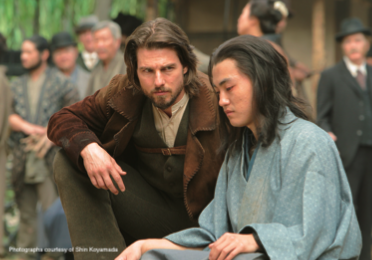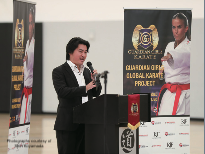Actor Shin Koyamada The Way of Life Through Karate
Shin Koyamada is an actor, producer, martial artist, philanthropist and entrepreneur. Shortly after moving to Los Angeles from Japan, Koyamada became known for his roles in the Hollywood blockbuster The Last Samurai alongside Tom Cruise and Ken Watanabe and Disney Channel’s Wendy Wu: Homecoming Warrior. The latter scored the highest rating in the history of Disney Channel in Europe and Japan. Since then, Koyamada has gained recognition for his long-running advocacy of global philanthropic causes, supporting many international non- governmental organizations around the world, including his own Koyamada International Foundation. Koyamada holds black belts in Japanese and Korean martial arts. He has also won U.S. national cham- pionships in Chinese martial arts. In 2016, Koyamada was appointed the Tokyo 2020 Summer Olympics Karate Ambassador. Tokyo Journal Editor-in-Chief Anthony Al-Jamie spoke with Shin Koyamada about how learning the way of life through karate influenced his journey in America, his career in Hollywood and his ongoing philanthropic projects, such as Guardian Girls.

TJ: How old were you when you first moved to the United States, and where did you live?
KOYAMADA: I was 18 when I first moved here. Initially, I lived in Moreno Valley for one month to study English at University of California, Riverside Extension, but then when I finished I didn’t have a place to stay, so I took the Metrolink to Hollywood Boulevard. It was crazy because I didn’t have a place set up for me to live right away. All of it was very scary. On my first night, I stayed in the cheapest motel I could find. I was homeless so I stayed at the Vagabond Motel for a few weeks. From there, I had to find an apartment. I asked everyone around, but it was difficult because I couldn’t speak English at the time, and I didn’t have experience with real estate because I had never had to find an apartment when I was living in Japan. So, it’s funny to see how far I was able to come. I’m thankful that my parents were able to send me money, and then later on, that I could send money back. At first, I taught karate to make money.
TJ: What is the significant impact that karate has had on your life?
KOYAMADA: I was able to overcome fear. Overcoming fear was something that I didn’t expect to learn when I initially trained in karate. The way my sensei taught me was all about not stepping back in fear. I was so scared. But no matter what, you have to keep moving forward. Even if you don’t know exactly what to do, just do something. And when I moved to the U.S., it helped me so much. There were so many new and uncertain things, and with my mindset, I could keep going and have that confidence. It also helped on a technical level because as an action star, I feel that it is very useful to have some sort of knowledge of martial arts. It helps with technique and strength, and to have courage in some of the stunts.
TJ: I understand that you practiced traditional karate. What do you think is the difference between traditional and competitive karate?
KOYAMADA: The difference is tremendous. With traditional karate, it becomes a way of life and as time goes on, it almost becomes second nature. There is also a way of fighting, as we fight with an “empty hand.” We don’t attack; we defend. It becomes a way of life with mind, body, and spirit. When you train like that, it doesn’t become just a technique anymore. It improves the quality of people’s lives. There is also a practicality to it as a long time ago, it was necessary to know some form of technique in order to protect yourself on a daily basis. Luckily now, there are laws that protect you, so there isn’t much of a need anymore. Competitive karate is a way to see how you have improved. With competitive karate, there is a set of rules that must be followed by both parties, which makes it a lot safer, of course, but when it comes to traditional karate, especially when it comes to any street fighting, anything goes. There is more of a mentality when it comes to traditional karate. If you just trained in sports karate, you wouldn’t be able to do traditional karate and vice versa. The goals are different. Sports karate is fighting for points, whereas traditional karate is not for points. It’s more of a way of life.
TJ: Going onto your acting career and your time in Hollywood, was The Last Samurai your first role? How were you able to get the role?
KOYAMADA: I was the first Japanese person to be cast in a major Hollywood film without a career in Japan. When I auditioned, they told me they were looking for my character for a long time and they were making sure they found the right actor. I feel like I got lucky. Usually, you become famous in Japan first, and then you’re able to transfer your career to the United States. Somehow, I bypassed all of that and was able to debut in Hollywood right away. It was a massive deal for Japan. When the movie came out, people didn’t really understand the history of Japan yet, but then when it came out, everyone was able to see what Japan was about.
TJ: How did you get the audition?
KOYAMADA: I found it on the Internet! There was an open casting call. This was in the summer of 2002. My friend was telling me that I should submit my headshot. At the time, I was just doing student films and commercials. I was doing everything I could to gain experi- ence. So, I thought it wouldn’t hurt to submit my headshot.
TJ: How did you get into Disney?
KOYAMADA: After The Last Samurai, I got a manager who told me I needed to get onto Disney Channel. I didn’t understand why at first, but then they told me all of the kids grow up watching Disney Channel, so it’s essential while you’re young. You can have young fans and you can grow up with them. You will always be their role model, and they will remember you, even when they are 20 or 30 years old. At the time, there wasn’t a Japanese actor in the U.S. on Disney Channel. Even in Japan, the Disney Channel wasn’t created until 2005. I was thankful that they came to me and asked me to be in Wendy Wu: Homecoming Warrior after The Last Samurai. It was the first Asian lead action movie for Disney Channel, and it was a considerable project. It became essential to have young kids look up to me, and I tried to do my best.
TJ: Please help our readers understand the importance of the Guardian Girls initiative.
KOYAMADA: Guardian Girls is a gender-based violence pre- vention and response program that empowers girls and women to defend themselves from all forms of violence through sports and martial arts training. The goal is to build the self-agency of women and girls for prevention and response to all forms of gender-based violence. Guardian Girls Karate has launched in seven countries – Egypt, Spain, the United States, Morocco, Japan, Ireland and Hungary, empowering hundreds of girls and women with differ- ent backgrounds through a series of training in karate self-defense. We have held two sessions in Los Angeles with World Karate Champion Elisa Au and U.S. Karate Olympian Sakura Kokumai as the instructors. The most recent, in April 2023, was supported by the National Karate-Do Federation, the World Karate Federation, the United Nations Population Fund, LA City Councilwoman Monica Rodriguez and Terasaki Budokan.
 tj
tj
The complete article can be found in Issue #282 of the Tokyo Journal.










